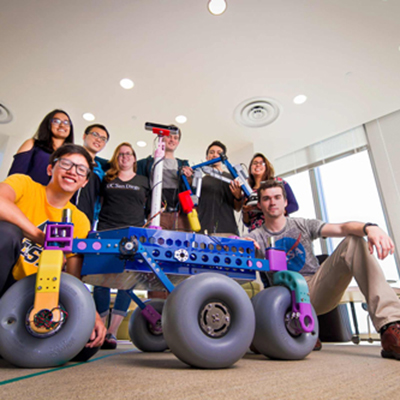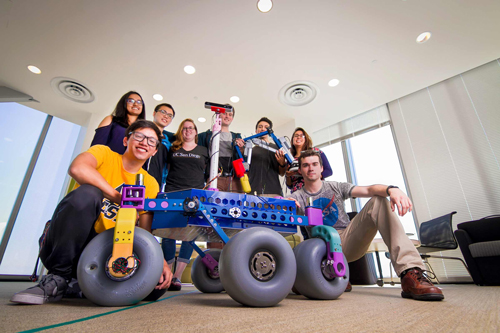
Computer Science alumnus Alex Smith (B.S. '16) may have graduated, but he's still spending most of his time on campus as part of the effort he co-founded, Yonder Dynamics, in fall 2015 with History major Kirk Hutchison. Today more than 40 students from multiple departments are spending all of their spare time working on the project to develop a next-generation Mars rover.

with their next-gen Mars rover.
[Editor's Note: Yonder Dynamics will hold a Simulation Day this Saturday, May 27, 2017 from 9:30 AM to 6:30 PM, at the Torrey Pines Gliderport. Throughout the day, the students will be putting their robot through a makeshift version of the competition's tasks. The event is open to the public.]
Yonder's semi-autonomous robot is one of just 36 that made it to the final round of the 2017 University Rover Challenge, an international robotics competition for college students put on by The Mars Society. Yonder Dynamics is the first UC San Diego team to compete in the challenge, and the only UC team to make it to the final round of competition this year. The team is sponsored, in part, by the Qualcomm Institute and is based in QI's headquarters building at UC San Diego, Atkinson Hall.
The University Rover Challenge consists of four tasks that involve soil testing, traversing difficult terrain, and assisting astronauts. While only one task -- the newly-added Autonomous Traversal Task -- requires autonomy, Yonder Dynamics hopes to go beyond that expectation and incorporate autonomy into as many of the tasks as possible. According to CSE alumnus Smith, the robots currently trawling the Martian terrain are feats of human ingenuity, but still largely restricted in their mobility and independence.

Yonder Dynamics rover team.
"Kirk and I believed that an injection of the most recent hardware could revolutionize planetary exploration," said Smith. "Not only would it allow for fully autonomous drilling, movement, and risk assessment, but it would also allow for continuous scientific experimentation and data collection, and the reduction of the communication delay between Earth and Mars."
Smith leads the Yonder Dynamics software and sensing team, which specializes in the computer science aspects of the rover (machine learning, computer vision, etc.) Other members of the team include Alex Haggart (CE '19), Kelvin Sarabia (CS '18), Cai Yeo (EE '20), Alexander Mai (CogSci '20), and Brian Truong Nguyen (CS '17). The team has been working to incorporate object recognition, visual odometry, and obstacle avoidance into the rover's systems.
The Yonder Dynamics rover will be programmed to recognize various objects and avoid obstacles in order to determine the best path for itself throughout the competition.
The last stage of the challenge takes place June 1-3 at the Mars Desert Research Station in Utah. The winning team will receive a cash prize and a trip to be present at the International Mars Society Convention.
In addition to the Qualcomm Institute, Yonder Dynamics is also sponsored by Thorlabs, Protocase, Meter Environment, ROHM Semiconductor, Cubic, the UC San Diego Jacobs School of Engineering and the UC San Diego Division of Biological Sciences.
Read the full article on the Jacobs School of Engineering website.

